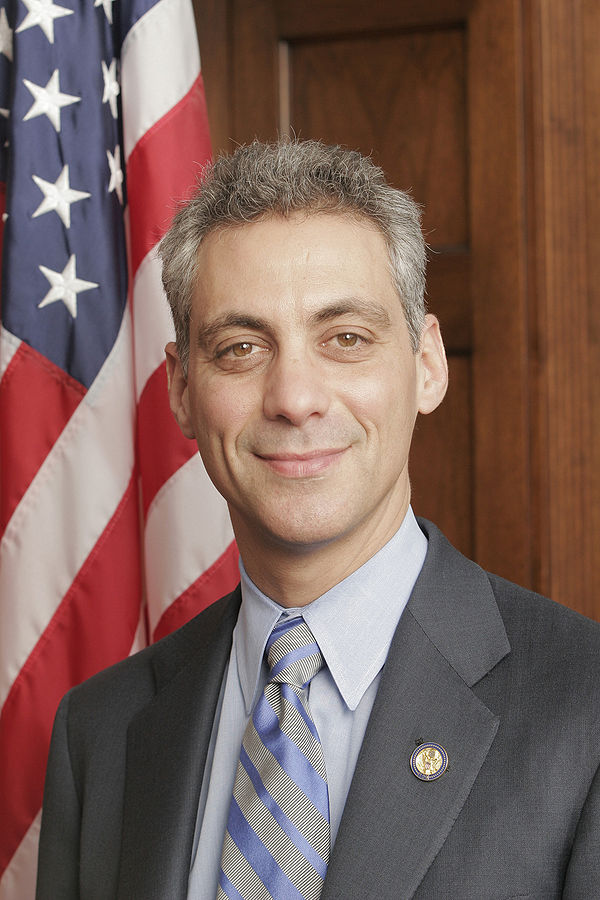
CHICAGO — Rahm Emanuel, whose tumultuous tenure as Chicago mayor included an infamous police shooting and a surge in violent crime, said in a surprise announcement Tuesday that he would abandon his plan to seek a third term next year but gave no reason for the sudden change of heart.
Emanuel also led the effort to conduct the largest mass closing of neighbourhood schools in American history and is credited with helping to stabilize the city’s finances through politically unpopular increases in taxes and fees.
The 58-year-old former White House chief of staff known for his pugnacious political style said only that he and his wife “look forward to writing that next chapter in our journey together.”
“This has been the job of a lifetime, but it is not a job for a lifetime,” the mayor said, reading prepared remarks at a news conference where he was joined at the podium by his wife. He held her hand throughout the announcement.
Before becoming mayor in 2011, Emanuel was a Democratic congressman and chief of staff to President Barack Obama. In winning the city’s top office, he succeeded Richard M. Daley, who was mayor for more than 20 years, and won a second term in 2015.
Emanuel had been running and raising money for months in preparation for the February election. The Chicago Tribune said he had already amassed more than $10 million to campaign for another four-year term.
His announcement came the day before jury selection for one of the biggest police-shooting trials in Chicago history, a case that seemed sure to renew questions about the city’s long effort to prevent the release of video showing white officer Jason Van Dyke shooting black teenager Laquan McDonald 16 times in 2014.
Many people asked whether Emanuel’s office delayed releasing the video to lessen the political damage.
“Imagine this trial is starting and what happened is going to get rehashed over and over and over again while you are in campaign mode,’ said Delmarie Cobb, a media and political consultant and a vocal critic of the mayor.
David Axelrod, a friend of Emanuel’s who worked with him in President Barack Obama’s White House, disagreed. He said Emanuel told him of his decision not to run over the weekend.
“I think he was aware of the timing of the trial, and he was also aware of what he did and didn’t do. And I think he was comfortable about that,” Axelrod said. “His concerns … were about his own level of energy and freshness.”
A verdict in the officer’s favour or a hung jury could prompt another crisis in the city, angering many Chicagoans, inviting large protests and creating a volatile political atmosphere.
No matter how the trial ends, Emanuel’s legacy as mayor will likely be tied to the case. The release of the video led to a Department of Justice investigation of Chicago police, culminating in a damning report last year that found widespread civil rights violations.
After the report, he vowed to carry out sweeping police reforms, which has already included fitting all patrol officers with body cameras and non-lethal stun guns.
Chicago’s violent crime drew national attention throughout Emanuel’s second term, with the number of shootings and homicides climbing to levels not seen in nearly two decades and exceeding the bloodshed of any other U.S. city. The number of slayings in each of the last two years was more than twice the total of Los Angeles and New York combined.
There are now no front-runners in the mayoral race, and Emanuel’s departure will almost certainly encourage others to enter it. The twelve candidates declared to date include a former Chicago police superintendent, Garry McCarthy; a former Chicago public schools CEO, Paul Vallas; and Cook County Circuit Court Clerk Dorothy Brown. They are all considered longshots.
Emanuel has been a profile writer’s dream, from his time as a ballet dancer, to the loss of part of a finger while operating a meat-slicing machine at a deli where he once worked. Obama enjoyed linking the incident with Emanuel’s fondness for profanity by joking that the loss of his middle finger “rendered him mute for a while.” Emanuel once sent a pollster a dead fish, which helped earn him the nickname “Rahmbo.”
His battle with the teachers union led to a strike in 2012 — the first in a quarter century. To shore up the city’s bleak financial situation, he was willing to do something no American mayor had ever done before: close 50 schools at once.
Emanuel several times referred to his family Tuesday, noting that his three kids are now in college. But he stopped short of saying family considerations drove his decision.
“Politicians always say they’re leaving office to spend more time with their family,” he said. “My kids were smart enough to see that coming and scattered to the two coasts. So as of the other day, we are now empty nesters.”
Emanuel grew up in the ritzy Chicago suburb of Wilmette, the son of an Israeli physician who moved to the United States. His start in politics came after college, when he worked for Sen. Paul Simon’s 1984 Senate campaign and Daley’s run for mayor in 1989.
Then he went to work for a little-known Arkansas governor who wanted to be president.
Emanuel’s fundraising skills helped keep Bill Clinton’s campaign afloat during some rocky times, particularly the scandal over whether he had slept with Gennifer Flowers.
Clinton made him his political director in the new administration, but internal tensions led to his comeuppance a year later, when he was demoted to a policy adviser.
Midway through Clinton’s second term, Emanuel left for Chicago to work in investment banking. The firm he joined was soon sold, and Emanuel made millions, giving him the financial security to get back into politics.